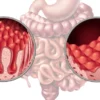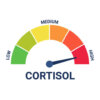
Living with Irritable Bowel Syndrome (IBS) can often be exhausting. The unpredictability, the discomfort, the trial-and-error of different treatments—it often leaves people searching for relief beyond conventional medicine. One complementary therapy that’s received increasing attention in recent years is acupuncture.
In this article, we explore what acupuncture is, how it works, and whether it could help alleviate IBS symptoms. As always, we take a balanced, research-informed view, while acknowledging the importance of a personalised approach to managing the complex condition than is IBS.
What is Acupuncture?
Acupuncture is a form of traditional Chinese medicine (TCM) that has been practised for thousands of years. It involves the insertion of very fine needles into specific points on the body (known as acupuncture points or acupoints) with the goal of stimulating the body’s natural healing mechanisms.
According to TCM principles, acupuncture helps to balance the flow of Qi (pronounced “chee”) – the body’s vital energy – through channels known as meridians. Although this concept may sound unfamiliar from a Western medical perspective, increasing research suggests acupuncture may offer real physiological effects that extend beyond the placebo response.
In modern settings, acupuncture is often used to help manage chronic pain, headaches, stress, and digestive issues, including IBS.
How Does Acupuncture Work?
While traditional theories talk about Qi and meridians, modern science has begun to explore the biological mechanisms behind acupuncture.
These include:
- Nervous system modulation: Acupuncture appears to stimulate the release of endorphins and other neurotransmitters, helping reduce pain and anxiety.
- Blood flow regulation: Needle insertion can improve microcirculation in targeted areas, supporting tissue healing and function.
- Anti-inflammatory effects: Acupuncture may modulate immune responses and reduce inflammation, both of which are relevant to IBS.
- Gut-brain axis regulation: Acupuncture has shown potential in balancing the communication between the gut and the brain, which is key in managing IBS.
Acupuncture may help influence both the mind and the body, making it a promising approach for a condition like IBS, which involves both physical symptoms and emotional stressors.
Can Acupuncture Help With IBS Symptoms?
IBS is a functional gastrointestinal disorder, meaning its symptoms are very real, but often not explained by visible structural damage. It affects around 1 in 10 people and commonly includes:
- Abdominal pain or cramping
- Bloating and excess gas
- Diarrhoea, constipation, or both
- Changes in bowel habits
- A sense of incomplete evacuation
So, can acupuncture help? Several small but promising studies suggest it might.
What the Research Says
A 2012 systematic review published in World Journal of Gastroenterology found that acupuncture was more effective than control treatments (such as sham acupuncture or antispasmodic medications) in relieving global IBS symptoms, especially abdominal pain.
Another study in PLOS ONE (2018) found that electro-acupuncture (a modern technique that uses small electrical currents) led to improved stool consistency and reduced bloating and anxiety in patients with IBS.
Although more large-scale, high-quality trials are needed, the existing evidence suggests acupuncture may offer real relief for some individuals, sparticularly when used as part of a holistic treatment plan.
Acupuncture Points for IBS
While treatment is always tailored to the individual, certain acupuncture points are commonly used for IBS. These points are chosen based on both TCM diagnosis and Western understanding of their physiological effects.
Common Points Used:
- ST36 (Zusanli): Located below the knee, ST36 is known for supporting digestive function, regulating bowel movements, and enhancing overall vitality.
- LR3 (Liver 3 / Taichong): Found on the foot, this point helps with stress relief, emotional regulation, and promoting smooth flow of Qi—important for those with stress-sensitive IBS.
- SP6 (Spleen 6 / Sanyinjiao): Located above the ankle, SP6 is used for improving digestion, reducing bloating, and supporting hormonal balance.
- CV12 (Ren 12): A point on the abdomen that helps reduce bloating, relieve nausea, and calm the stomach.
- LI4 (Large Intestine 4 / Hegu): Often used for pain and tension relief, and also involved in regulating bowel function.
Each of these points is believed to support not just digestive health but the body’s broader ability to regulate itself, an important consideration when managing a complex, systemic condition like IBS.
Acupuncture vs. Traditional IBS Treatments
Conventional IBS treatment typically involves dietary adjustments (such as the low FODMAP diet), stress management, medications like antispasmodics or laxatives, and psychological therapies such as CBT. These are all evidence-based and can be highly effective, but they don’t always work for everyone.
How Acupuncture Compares
| Traditional Treatments | Acupuncture |
| Targets specific symptoms (e.g., diarrhoea, constipation) | Aims to treat the whole person (mind + body) |
| May involve side effects from medications | Generally low risk and well tolerated |
| Often backed by large clinical trials | Growing evidence base but more research needed |
| Focuses on disease management | Encourages self-regulation and healing |
Many people find that combining acupuncture with conventional treatment provides a more comprehensive approach, especially if stress or emotional health plays a big role in their symptom flare-ups.
Side Effects and Risks of Acupuncture for IBS
When performed by a qualified practitioner, acupuncture is considered very safe. That said, no treatment is completely without risks.
Possible Side Effects Include:
- Mild bruising or soreness at needle sites
- Dizziness or light-headedness (especially after the first session)
- Fatigue or emotional release
- Rarely: infection (if unsterilised needles are used)
To reduce the risk of adverse effects, it’s important to choose a licensed acupuncturist who follows strict hygiene standards and has experience treating digestive issues.
How Long Does Acupuncture Take to Work for IBS?
One of the most common questions people have is, “How quickly will I feel better?” The answer varies, but here’s a general guide:
- Initial Relief: Some people notice a difference within 2–3 sessions, particularly in terms of reduced stress or improved sleep.
- Symptom Improvement: For digestive changes, you might need 4–8 weekly sessions before seeing noticeable improvements in pain, bloating, or bowel regularity.
- Maintenance: Once symptoms begin to stabilise, treatment may shift to bi-weekly or monthly to maintain results.
Consistency is key. Like many holistic therapies, acupuncture’s benefits are often cumulative rather than instant.
Other Alternative and Complementary Treatments for IBS
If you’re exploring acupuncture, you may also be interested in other non-pharmaceutical strategies for managing IBS. Some evidence-backed options include:
- Supplements (e.g., probiotic, prebiotics, digestive enzymes)
- Hypnotherapy (especially gut-directed hypnotherapy)
- Cognitive Behavioural Therapy (CBT)
- Yoga and meditation
- Herbal medicine (e.g., oregano, peppermint oil, turmeric)
- Dietary therapies (e.g., low FODMAP, gluten-free)
- CBD oil for gut-brain axis regulation
A truly holistic approach often involves combining therapies to address multiple aspects of the condition: physical, emotional, dietary, and neurological.
When to Consult a health care professional
While acupuncture can be helpful, it’s essential to rule out more serious gastrointestinal conditions before starting any complementary treatment. See your GP or a specialist if you experience:
- Unexplained weight loss
- Blood in your stool
- Persistent diarrhoea or vomiting
- Anaemia or nutrient deficiencies
- Family history of bowel disease
Acupuncture should be part of a broader, informed care plan, ideally one that brings together medical expertise, functional testing, and holistic support.
Cost of Acupuncture for IBS
Cost can vary depending on your location, practitioner experience, and the length or frequency of sessions.
In the UK:
- Initial consultation: £40–£80
- Follow-up sessions: £35–£65
- Packages: Some clinics offer discounts for pre-paid sessions
Acupuncture is not typically covered by the NHS (except in some pain clinics), though private health insurance may reimburse part of the cost.
Given that IBS is a chronic condition, it’s important to budget for multiple sessions and consider acupuncture as a longer-term investment in your well-being.
Conclusion
So, can acupuncture help treat IBS? For many people, the answer is yes, especially when IBS is triggered or worsened by stress, anxiety, or hormonal changes. Acupuncture offers a low-risk, potentially effective option that supports not just digestive health but your whole-body resilience.
That said, it’s not a magic fix. IBS is a complex, multifactorial condition, and the best results often come from a combined approach, one that includes evidence-based medicine, lifestyle changes, and complementary therapies like acupuncture.
If you’re curious about whether acupuncture could work for you, speak to a qualified acupuncturist and your healthcare provider. Relief may not come overnight, but with the right guidance and consistency, it is possible to start feeling better and reclaim your gut health one needle at a time.
References
References – Acupuncture
- World Journal of Gastroenterology – Effectiveness of acupuncture to treat irritable bowel syndrome: A meta-analysis
- American Journal of Gastroenterology – Acupuncture for irritable bowel syndrome: systematic review and metaanalysis
- BMC Gastroenterology – Acupuncture for irritable bowel syndrome: primary care based pragmatic randomised controlled trial
- Journal of Pain Research – Analysis of electroacupuncture parameters for irritable bowel syndrome: A datamining approach
- Alimentary Pharmacology & Therapeutics – Metaanalysis: PostCOVID19 functional dyspepsia and irritable bowel syndrome (includes acupuncture context)
- Cochrane Database of Systematic Reviews – Acupuncture for treatment of irritable bowel syndrome
Last updated
Uploaded by Martin Cohen on 15/07/2025






